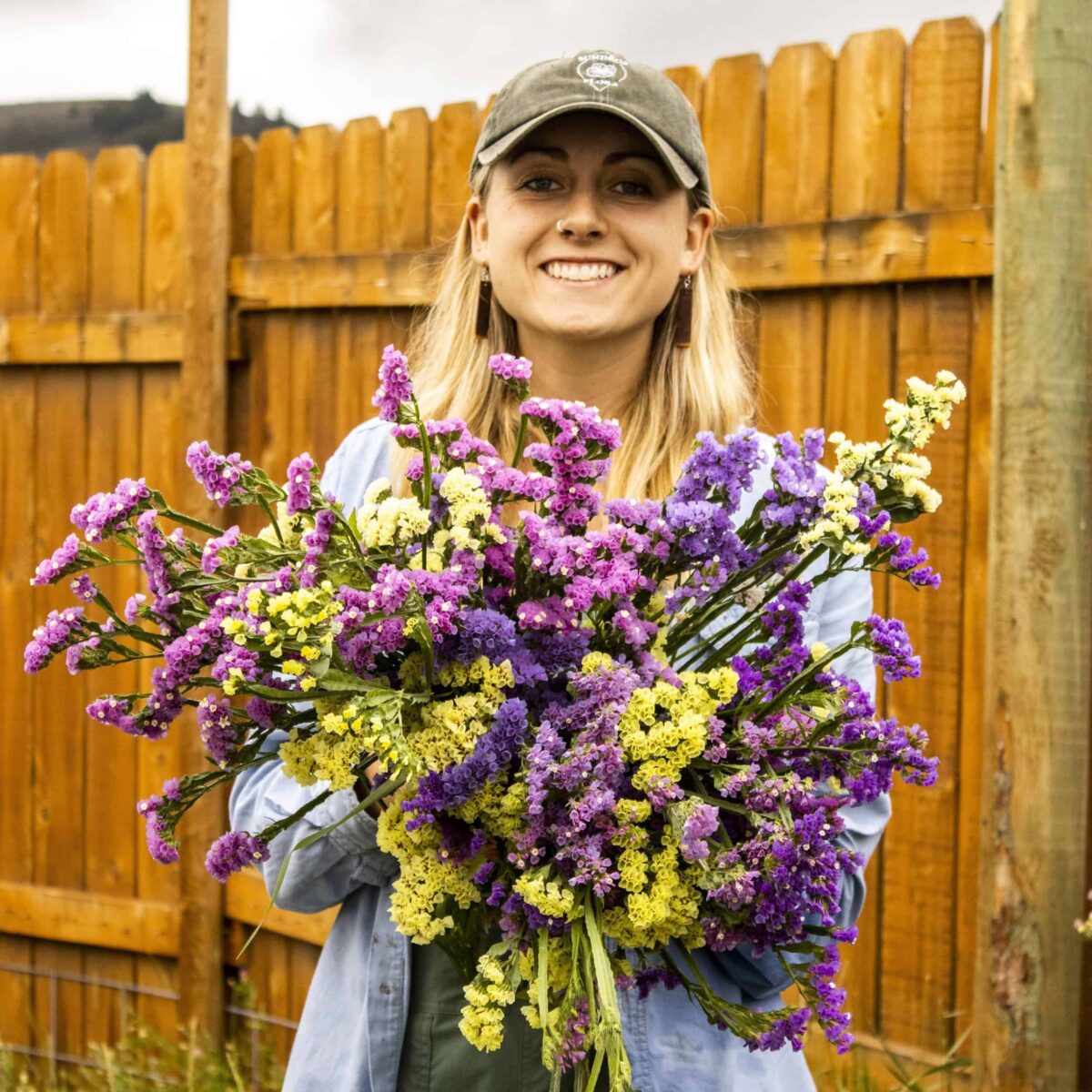Photos courtesy of Alexis Taylor
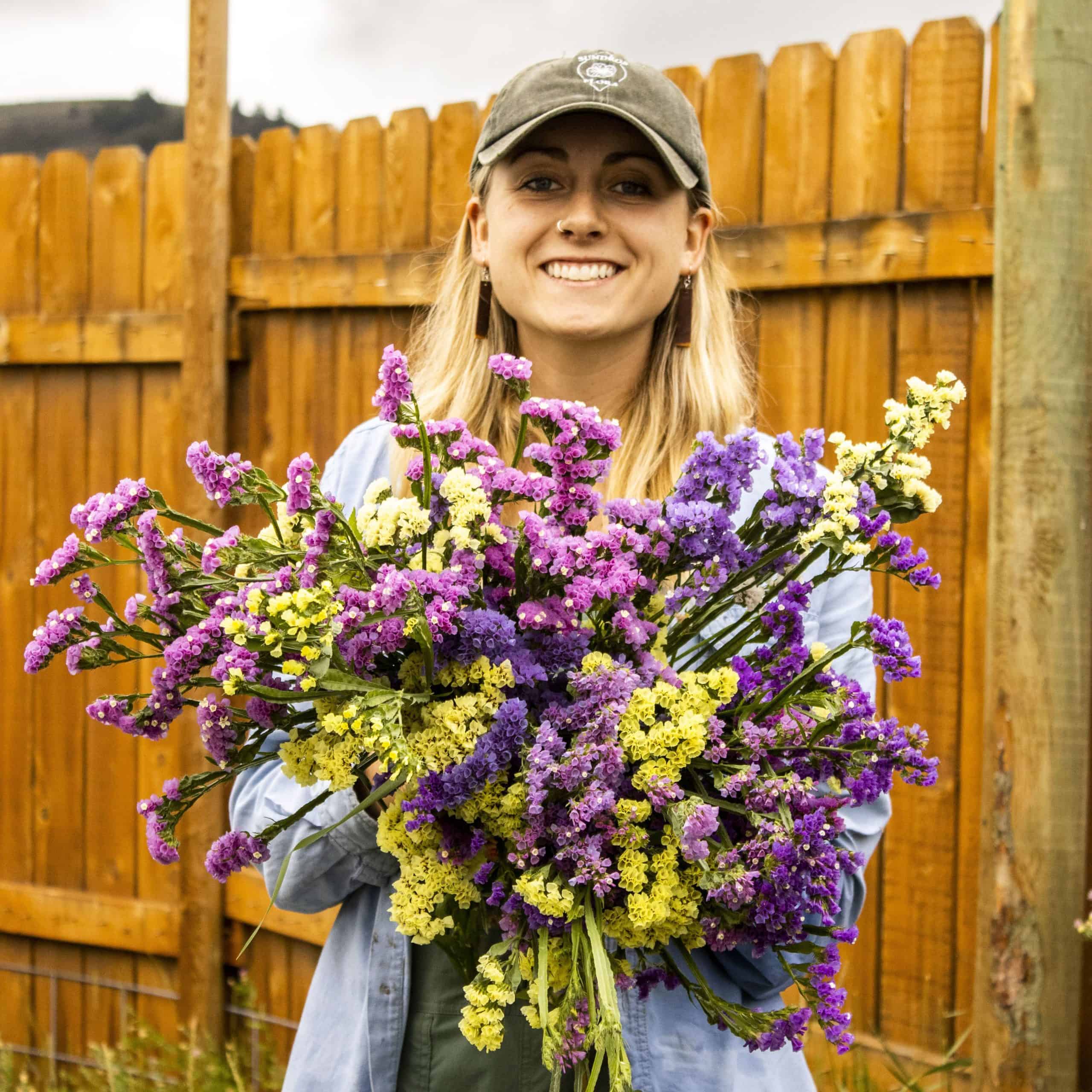
“[For] us living in this dreadfully capitalistic environment right now, with major corporations running everything — I think a lot of times people throw all business into that,” says Alexis Taylor, the owner of Sundrop Flora, a Gunnison-based company that grows sustainable flowers and herbs.
Originally from the Midwest, Taylor spent eight years in Louisiana, studying small business and entrepreneurship at Southeastern Louisiana University.
She remembers being asked by her professor to manage the local campus’ farmers market in Hammond for academic credit, engaging her budding love for small business.
“Even more than the management aspect of it, I really enjoyed meeting the local farmers. Local food was not something I’d ever thought about,” explains Taylor of her first real exposure to local food culture.
In that managerial role, she learned about regenerative and organic food systems, sparking a desire to delve deeper into the agricultural world.
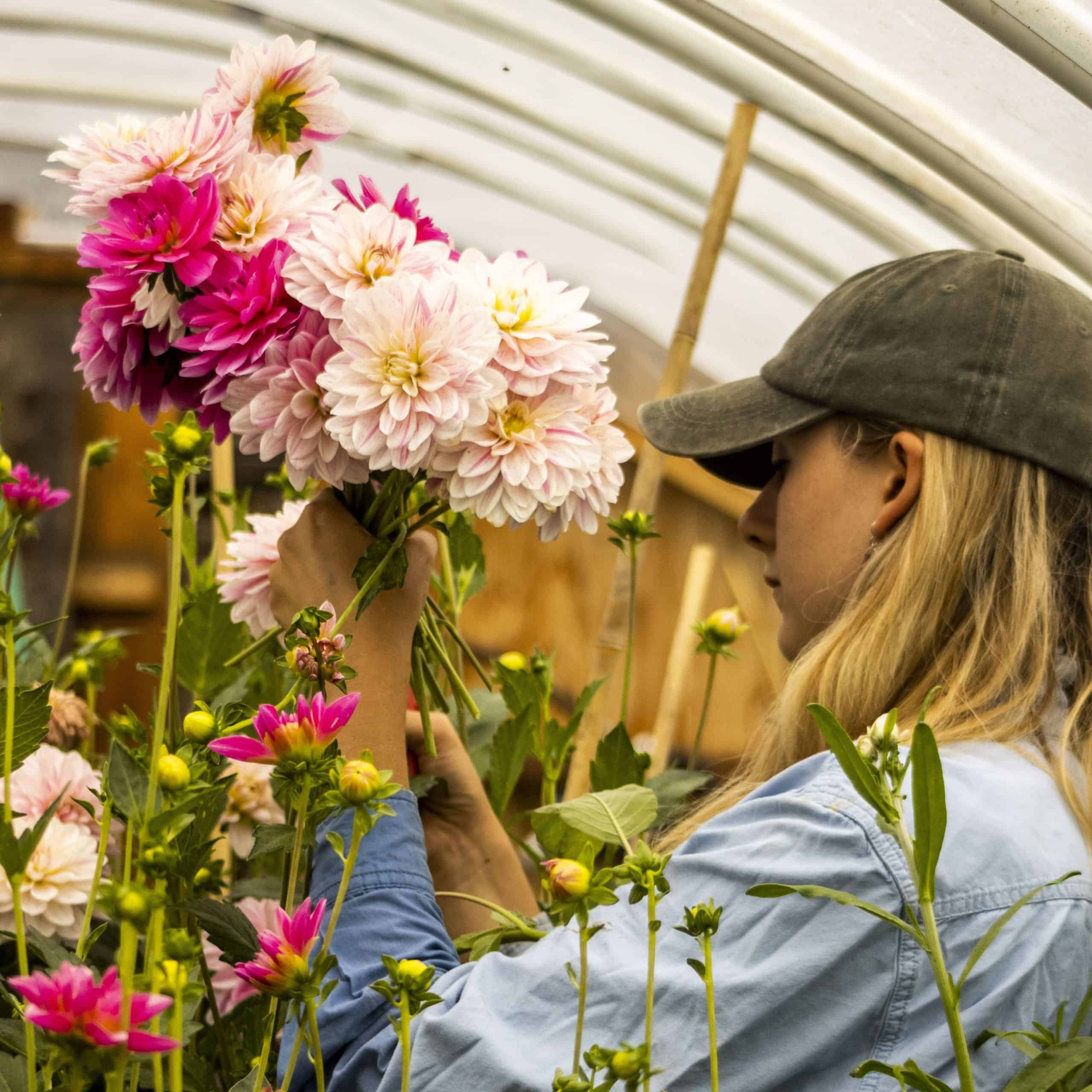
A farming journey
Taylor would soon get the chance to make her agricultural ambition a reality.
After graduating college, Taylor moved to Gunnison to work in an AmeriCorps developmental role with the Mountain Roots Food Project, putting her skills in business management to work.
“I had this idea that I wanted to be in the mountains,” she recalls.
Later, after meeting her partner, Matthew Ozyp, who started Iola Valley Farm in 2017, Taylor identified the perfect opportunity, and set out to give farming an honest try.
Before long, she became the farm’s operations manager and helped manage the business portion of the two-acre, regenerative operation, situated 25 minutes by car from Gunnison, between Blue Mesa Reservoir and Powderhorn.
She launched the Iola Valley Farm’s community supported agriculture (CSA) program, which has teamed up with Sue Wyman’s Gunnison Gardens to serve up to 50 people this year as the Solstice to Equinox CSA.
What would soon become Sundrop Flora first began as an early pandemic experiment on some unused land at Iola Valley, where Taylor tinkered with growing flowers. She sold that early bounty at the Crested Butte’s Farmer Market on Thursday evenings.
Starting in February of 2022 she struck out on her own, making the leap to full-time farmer and business owner, leasing growing space in seven hoop houses from Iola Valley Farm.
What initially began as a side project has blossomed into a full-time operation, and Sundrop Flora has joined a cohort of small businesses — including a number of local farming operations — creating value and community within the hyper-local, interconnected Gunnison Valley.
“Small businesses are why we love community. We want to show up for karaoke at Double Shot [Cyclery], we gather at the coffee shops, and we eat the good food at 1880 [Tapas & Spirits]. We enjoy all this stuff that small businesses have created,” Taylor says.
She’s embracing every aspect that accompanies owning a small business: the never ending to-do list, the creativity of brainstorming new events and then willing them into existence, and the inherent challenge of growing flowers without the aid of chemicals in a harsh, mountainous environment.
Then, there’s the financial considerations: “How do I price things where it’s fair and I make money, but it’s still accessible to not just a certain niche of people that can afford it?” she asks. “I want everyone to be able to enjoy it.”
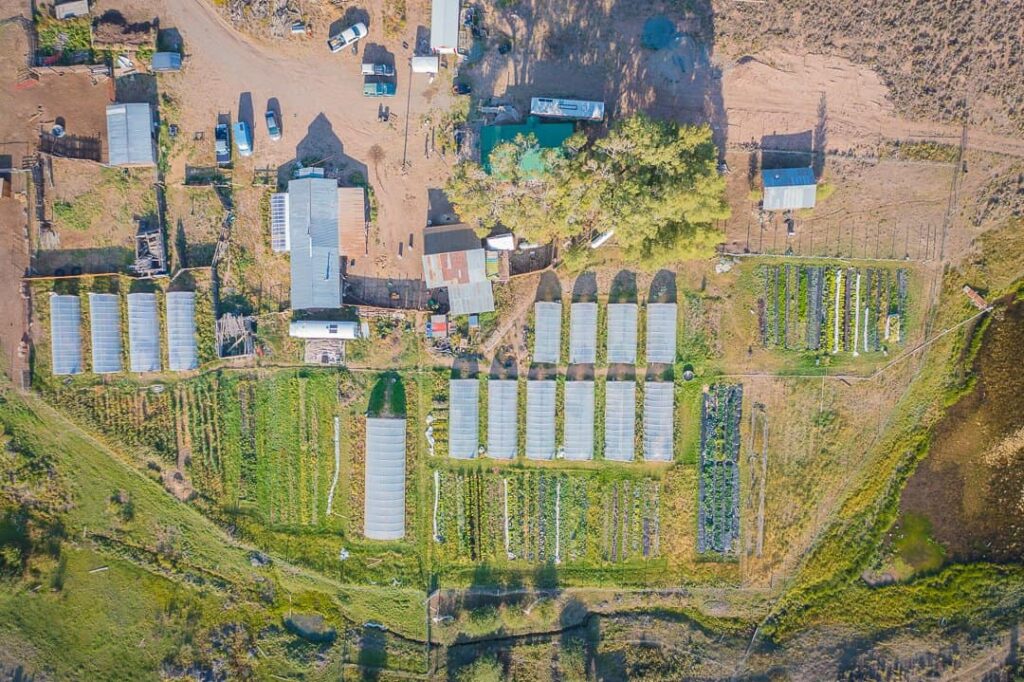
Sundrop Flora blooms in its second season
Heading into her second growing season, Taylor is at the helm of growing business that includes selling ornamental arrangements and edible flowers to local restaurants and catering companies like Garlic Mike’s, 1880 Tapas & Spirits and Crested Butte Personal Chefs.
“It was so special for us to have the most amazing, locally-grown flowers at Garlic Mike’s this summer,” wrote Traci Busse, co-owner of Garlic Mike’s, in a testimonial.
This year, she’s also delivering personalized floral arrangements for 14 weddings and elopements.
Catering to the preferences of those brides- and grooms-to-be, Alexis notes, has involved a higher level of planning and personal consultation with clients than in her first year in business, when she largely selected flowers based on her own personal preference.
“I had to make a spreadsheet of all the different colors they want and make sure I have the seeds to be,” said Taylor, who was initially daunted at the prospect of provisioning flowers for weddings.
But she realized over the course of last year’s season that because she doesn’t utilize any preservatives or spray paint — like many floral providers do — some of her flowers may be better suited for use in one-off events.
That’s particularly true for species like dahlias, which stay fresh for just 24 to 48 hours after that first cut.
“For weddings, that’s just perfect,” says Taylor, who is looking to sell edible flowers that could top wedding cakes as garnishes, including a prospective new partnership with Cake Me Away in Gunnison.
On the other hand, some of Taylor’s customers said that her flowers outlasted grocery store alternatives, even without the boost offered by chemicals.
“Some of that does depend on how they treat their flowers,” says Taylor.
For flower lovers, she recommends recutting the stems every day with clean, sharp scissors (for easier rehydration), using flower food packets, keeping the vase sparkly clean, treating the flower’s water with vinegar and sugar, and keeping bouquets out of direct sunlight.
Taylor’s also looking into organic methods for extending the base life of her flowers on the production end. The trick to extending a flower’s life lies largely in the harvesting process, which is specific to each species.
Many flowers need to be harvested before bees come by to pollinate them. Others, like the cornflower, are best harvested before the bud fully pops.
In the floral business, being early is critical. On harvest days, Taylor is up before 6 a.m., taking full advantage of the farm’s cool summer mornings to keep the flowers as fresh as possible. Once cut, the flowers go straight into water treated with vinegar and sugar, and are ready for arrangement.
Taylor’s arranging process is more free flowing than that of many professional arrangers, which is a perk in the eyes of many of her customers. She draws inspiration from online bouquets and tutorials while maintaining a fresh from the garden, wildflower-like appeal, trusting her visual instincts.

Serving the community
Altogether, the community feedback Taylor has received on both her edible and decorative flowers from her first season was overwhelmingly positive.
One testimony particularly stuck out to Taylor: A local mother who expressed to her that Sundrop Flora allows her to buy flowers for her daughters without the accompanying fear that smelling the flowers will expose them to harmful chemicals.
It’s exactly that kind of feedback that rejuvenates Alexis at the end of a strenuous, nonstop growing season.
For individual buyers, Sundrop Flora offers a slew of different options to add some color to your daily routine, or spruce up that special event. You can purchase Taylor’s bouquets online via Sundrop Flora’s website or Instagram, and place an order for custom event packages.
For the hardcore flowerheads out there, the company’s flower share CSA program doles out weekly bouquets of Sundrop’s flowers for two months, a package which includes an additional dried bouquet and an edible bag of flowers.
This year, Taylor is planning to produce more edible flowers: For sale to local businesses, usage in the flower share, and general sale at the Saturday Gunnison Farmers Market, where prospective customers can get a feel for Sundrop Flora’s wares starting in July.
The company’s most popular edible varieties include pansies, snapdragons, cornflowers, and nasturtiums, Taylor’s personal favorite, which boast a distinct, peppery flavor.
“You can stuff them with cream cheese and do all sorts of stuff, but they’re also just beautiful,” she says.
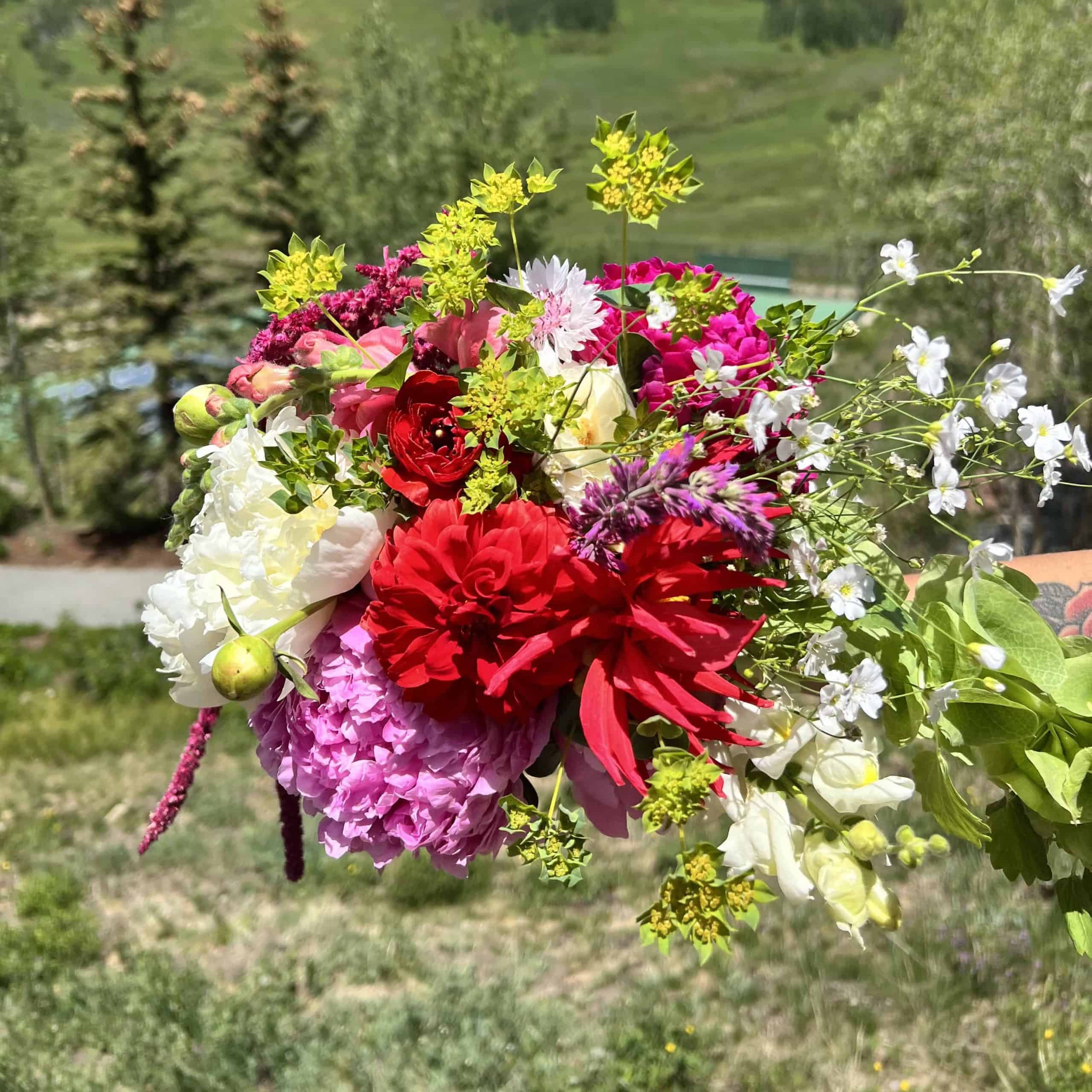
Setting a higher standard
Taylor describes her process of growing flowers as “beyond organic” — an acknowledgement that Sundrop Flora is not certified organic by the USDA (the process is lengthy, and can be quite expensive), but also a nod to the care she puts into the environmental side of farming.
Historically, the flower business has been far from sustainable. In order to meet the need for flowers around the globe, fresh flowers are often flown via refrigerated plane from Latin America, with Colombia, Ecuador and Africa’s Kenya being the world’s biggest exporters.
The $55 billion dollar cut flowers industry, with the U.S. providing the bulk of the demand, largely revolves around just a handful of holidays: Valentine’s Day, Mother’s Day, and Christmas.
High water use, particularly in water-stressed regions, combined with significant chemical input (and the subsequent runoff into local waterways), and the cumulative emissions from air travel and the requisite refrigeration contribute to a less-than-rosy environmental outlook for the industry.
But Taylor is hoping to change that narrative, at least locally, by producing flowers for the surrounding community without the aid of chemicals.
Then there’s the issue of water, a consistently thorny topic on the western slope of Colorado. In her Iola Valley hoop houses, Taylor distributes pond and well water via handmade PVC drip irrigation lines twice a day, conserving the precious resource in water-stressed Gunnison, which has faced drought for more than two decades.
This year, Taylor’s stoked about the heavy snowpack (which has continued in March), which should alleviate most of the late season water worries she experienced in 2022.
Since 2020, Iola Valley Farm has made their own compost from the waste generated by the operation’s sheep and chickens. Sundrop Flora, which leases it water from Iola, utilizes that same compost. This year, Taylor is adding in a cut-flower compost mix, made by Paonia Soil Company, which boasts “maximum pigment production.”
For nearly all agricultural producers, pests are a consistent source of stress. Sundrop Flora’s first season was no exception, as Taylor’s operation suffered an aphid outbreak.
To combat the marauding insects, Taylor sprayed Dr. Bronner’s certified organic soap and organic aphid spray, with moderate effectiveness.
With the aphid invasion, though, comes the greater recognition that losing crops is a natural, largely unavoidable part of the farming process: “The [flowers] that are really covered in aphids, I just throw away, instead of trying to resuscitate them,” she said.
In her years of local farming, Alexis has learned firsthand that some plants just weren’t meant to grow in the Gunnison Valley, particularly without the aid of chemical fertilizers, pesticides, and herbicides.
When farming at 8,300 feet — with a growing season estimated at less than 100 days (the season is growing due to climate change), it’s critical to recognize the environmental limitations in play — and abide by them.
Last year, Taylor started seeding in February, heating the hoop houses initially, deploying frost cloth, and taking advantage of the heat offered by an adjacent shed to get her growing season off to an early start.
This year, she’s predicting a later winter and a colder spring, and opted to start her seeds the first weekend in March, when it was slightly warmer. She predicts that with the later start, her flower production won’t really get rolling until early July.
Even with a late start, just growing flowers in Gunnison may strike some as moderately crazy, but Taylor refuses to be deterred.
“Your seeds are supposed to stay at 60 degrees, but part of my theory is that they have to get ready for being in Gunnison,” she says with a laugh.
She planted her first seeds the first weekend in March, and anticipates that she’ll continue growing flowers through late September, when her final wedding is scheduled.
Beyond the growing period, she’s looking at other ways to extend her season, aiming to capitalize on holiday splurging by selling dried bouquets, an herbal tea blend, and wreaths in local holiday stores well into the fall.
“It’s a short growing season, and that also means a short income season. I need to extend that, without burning out too much,” she explains.
Ultimately, Taylor says that the shorter growing season, while limiting in some ways, has a notable upside:
“That’s actually one of the reasons I love growing here. Farmers already work so much that it’s nice to be able to have a break over a couple of months [in the winter].”

Flower-powered events
In 2023, Sundrop Flora will co-host a number of events, including a partnership with Buckel Family wine, where Taylor will host a floral arrangement workshop on Thursday, July 27. That event will afford individuals the chance to learn arranging techniques and assemble a personalized bouquet .
Sundrop Flora is also slated to host a U-Pick flowers event at a date yet to be determined out at the Iola Valley Farm, and Taylor encourages prospective patrons to “bring your date, your kids, your mom out to the farm to pick your own beyond organic flowers.”
The creation of the U-Pick event was spurred by consistent feedback that customers wanted to witness the beauty and tranquility of a flower farm for themselves.
“It is so beautiful and quiet out there. There are ponds, and the sunset is always gorgeous,” says Taylor of the Iola Valley Farm space. “We have the sheep and the chickens … to be able to come out and see a working farm is exciting.”
In her dream world, Alexis would love to be able to offer the event once a month, and offer little flower cookies to guests as part of a more holistic experience. Her passion and skill for event planning, however, must coexist with the intensive reality of day-to-day farming
Whether it’s a romantic date setting or a family day involving sheep petting at the farm, Taylor has plenty of ideas in development about how to tailor future events around Sundrop Flora — allowing customers to witness the growing process — and bringing them out to her product in a nice changeup from the norm.
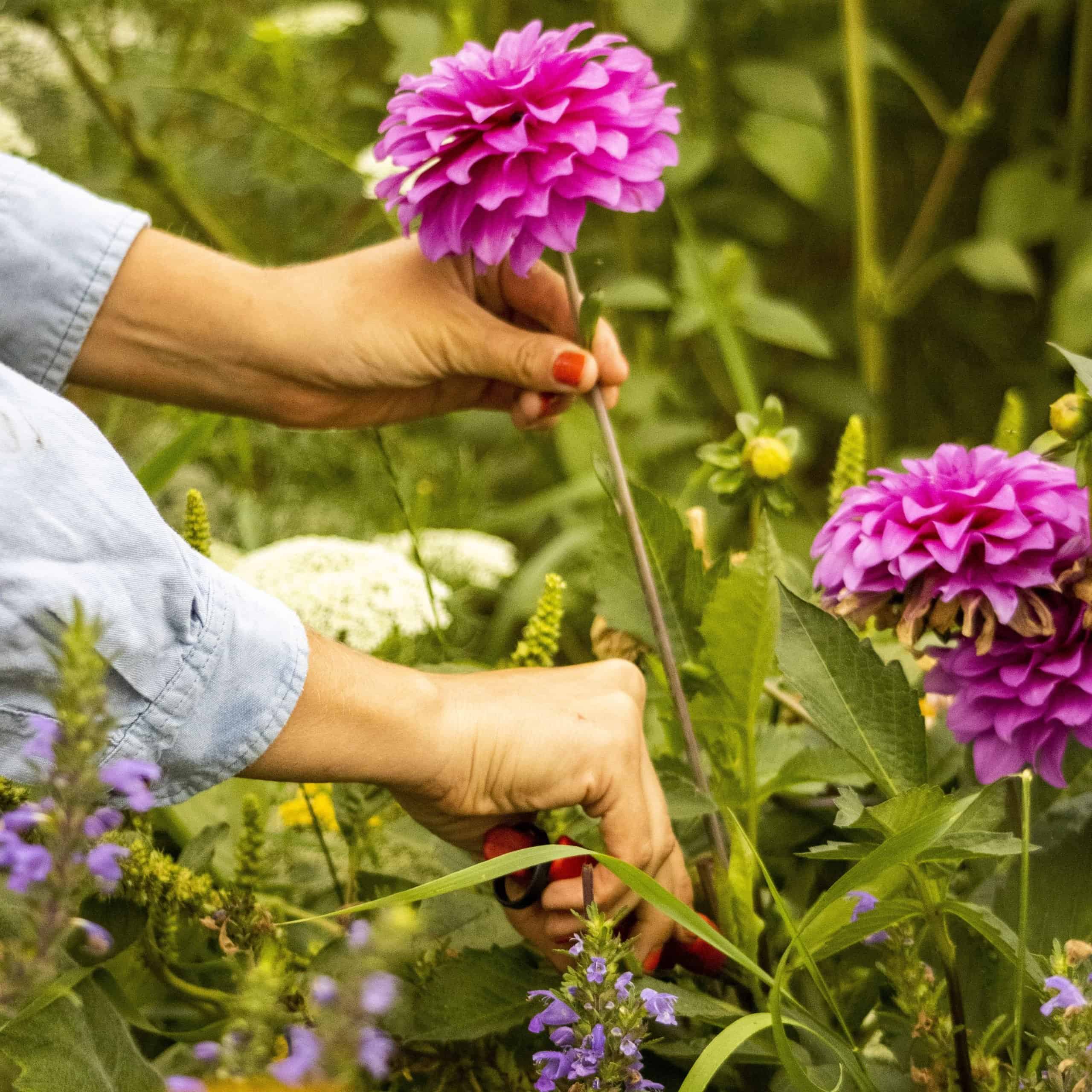
The heart of Sundrop Flora
Looking ahead to the frantic summer season, Taylor has applied for a grant to pay salary for a part-time employee to continue maintaining a presence at the Gunnison Farmers Market when Taylor is tied up with weddings and other engagements.
In a nod to her own agricultural backstory, Taylor says that farmers markets provide an avenue for the kind of direct feedback and word-of-mouth advertising that can greatly aid a growing small business — and cultivate a sense of shared community.
On a more personal level, Taylor says that her ADHD, which makes it difficult to work for others on a set schedule, has pushed her towards a life as a small business owner, despite the long hours and inherent difficulties that lifestyle poses.
“A ton of people with ADHD have their own businesses,” she explains. “I need the flexibility to go with my brain, and be like: today’s a great day and I’m working for 15 hours, and maybe the next day is not so great and I’m [only] working for four.”
For Taylor, all that hard work pays off when she’s able to offer her hard-earned, sustainably grown flowers to the greater Gunnison community.
“Flowers are with us in many of our most important moments: Weddings, funerals, birthdays. They are a gift of love and care, and I want to provide my community with an alternative to conventionally-grown flowers, so that on our most important days we can be surrounded with earth-friendly flowers,” she writes.
You can follow along with Sundrop Flora on Instagram, and be sure to check out all of Taylor’s offerings on the company’s website.


